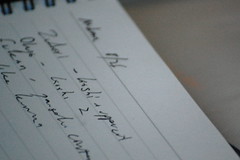What Martial Arts Can Teach Us About Improving Presentations
One of the keys to being successful in the martial arts is taking good notes, storing away information. In ninjutsu, a secondary key is taking good notes in such a way that your notes are useful only to you. If someone borrows, copies, or steals your notes, they’re functionally useless to them. Yes, you may have possession of the Takagi family’s sacred scrolls, but unless you’ve been initiated into translating them, they’re not terribly helpful.
 I was looking over my notes from Tuesday night’s class at the Boston Martial Arts Center, my personal notes for second degree black belt, and realized that in many ways, they’re the antithesis of a good presentation.
I was looking over my notes from Tuesday night’s class at the Boston Martial Arts Center, my personal notes for second degree black belt, and realized that in many ways, they’re the antithesis of a good presentation.
In my notes, I have the general prompts I need to recall something from memory, not a step by step outline of exactly what to do. I know what to do because my teacher taught it to me, but if I need to jog my memory about the setup, my notes contain enough detail to make me go, “Oh, yeah, that one!” and I’m ready to go. None of the nuance or subtlety makes its way into the notes because it doesn’t need to be there, and more importantly, can’t easily and quickly be put into words anyway, any more than you can accurately convey what a lychee tastes like in words. If you’ve had a lychee, you know exactly what I’m talking about. If you’ve never had a lychee, that sentence is devoid of context.
This is the danger, the curse of knowledge, that plagues presentations. The presenter knows what’s in their notes, and knows the subject matter, which means they risk leaving out vital pieces of information that surround their presentation, the context. The presentation may have giant gaps in it, but the presenter doesn’t know it because they don’t see their presentation – they see their experiences instead, filling in the gaps in their own head but leaving huge potholes for the audience trying to follow along.
This is why in both the martial arts and in Zen the concept of the beginner’s mind is so important, to be able to see without the past clouding our vision. As a presenter and speaker, seeing your own material with a beginner’s mind is vital but supremely difficult.
Listen carefully to the feedback from your presentations to see whether you’re failing to provide context and details in your presentation. You may find some critical points that, with just a few extra details, could radically improve your presentations.
Besides audience feedback, make sure you review video of yourself presenting, and ask yourself throughout the video if you’re making sense. If you can, have two cameras set up, one to film the audience, so that you can watch the crowd react to what you have to say, catching subtleties that you missed while presenting. It doesn’t have to be elaborate or expensive – a simple Flipcam on a tripod will do the trick. Be on the lookout especially for body language changes en masse, as well as facial expressions – these nonverbal cues can tell you when you’re being impactful – and when you’re missing the point.
As Shunryu Suzuki, a Zen master, said, in the beginner’s mind there are many possibilities, in the expert’s mind there are few. If you want to explore the possibilities of becoming a better speaker, embrace the beginner’s mind and avoid the curse of knowledge.
Did you enjoy this blog post? If so, please subscribe right now!
Get this and other great articles from the source at www.ChristopherSPenn.com



Leave a Reply